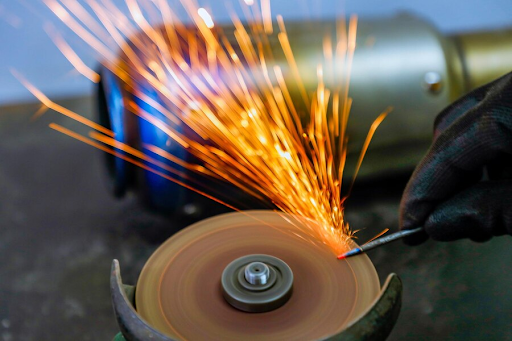In the intricate world of material machining and surface finishing, the choice of grinding wheels plays a pivotal role in achieving desired precision and perfection. Among the array of grinding wheel options available, resin bond grinding wheels stand out for their unrivaled performance and versatility. In this article, we embark on a journey to explore the superiority of resin bond grinding wheels, uncovering the secrets behind their exceptional material precision and surface perfection.
Understanding Resin Bond Grinding Wheels
Resin bond grinding wheels are a type of abrasive tool where abrasive grains are held together by a bonding matrix composed of synthetic resin. This matrix provides excellent adhesion and cohesion properties, resulting in a durable and efficient grinding tool. Unlike other bonding systems such as vitrified or metal bonds, resin bonds offer unique advantages that make them highly suitable for a wide range of applications.
Advantages of Resin Bond Grinding Wheels
Resin bond grinding wheels are renowned for their exceptional performance and versatility in material machining. With their unique characteristics, these wheels offer unparalleled advantages that set them apart in the world of abrasive tools.
- Versatility: Resin bond grinding wheels are highly versatile and can be tailored to suit specific machining requirements. They are compatible with a wide range of materials, including metals, ceramics, composites, and more. This versatility makes resin bond wheels indispensable in industries ranging from automotive and aerospace to electronics and medical devices.
- Cool Cutting Action: One of the key advantages of resin bond grinding wheels is their ability to generate less heat during the grinding process compared to other bonding systems. This “cool cutting” action helps prevent thermal damage to the workpiece and prolongs tool life, resulting in superior surface finishes and dimensional accuracy.
- Reduced Wheel Wear: Resin bond grinding wheels exhibit minimal wheel wear and self-sharpening characteristics, thanks to the resilience of the resin bonding matrix. This leads to longer wheel life and consistent performance over time, reducing the need for frequent wheel dressing and replacement.
- Enhanced Surface Finish: Resin bond grinding wheels are capable of producing exceptionally smooth and precise surface finishes, making them ideal for applications where surface quality is critical. The uniform distribution of abrasive grains in the resin matrix ensures consistent material removal rates and minimal surface defects.
- Low Vibration and Noise Levels: Compared to metal bond grinding wheels, resin bond wheels generate lower levels of vibration and noise during operation. This not only improves operator comfort but also contributes to a safer and more productive working environment.
Applications of Resin Bond Grinding Wheels
Resin bond grinding wheels find widespread use in various industries and applications, including:
- Precision Grinding: Resin bond wheels are commonly employed for precision grinding tasks that require tight tolerances and high surface finish quality. Examples include tool and cutter grinding, surface grinding, and cylindrical grinding operations.
- Semiconductor Manufacturing: In the semiconductor industry, resin bond grinding wheels are used for dicing, slicing, and shaping silicon wafers with unparalleled precision and surface integrity.
- Optical Fabrication: Resin bond wheels play a crucial role in the fabrication of optical components such as lenses, prisms, and mirrors. Their ability to produce ultra-smooth surfaces ensures optical clarity and performance.
- Composite Materials Machining: Resin bond grinding wheels are well-suited for machining composite materials used in aerospace, automotive, and marine applications. They provide efficient material removal while minimizing delamination and fiber pull-out.
- Medical Device Manufacturing: In the medical device industry, resin bond wheels are utilized for grinding and finishing implants, surgical instruments, and other precision components with stringent quality requirements.
Optimizing Performance with Resin Bond Grinding Wheels
To maximize the performance of resin bond grinding wheels and achieve superior material precision and surface perfection, several factors should be considered:
- Selection of Abrasive Grit: Choose the appropriate abrasive grit size and type based on the material being machined and the desired surface finish. Finer grit sizes result in smoother surface finishes, while coarser grit sizes are more aggressive but may leave deeper scratches.
- Controlled Grinding Parameters: Optimize grinding parameters such as wheel speed, feed rate, depth of cut, and coolant/lubricant flow to ensure efficient material removal and minimize heat generation. Maintaining proper grinding conditions is essential for achieving consistent results.
- Wheel Dressing and Truing: Regularly dress and true resin bond grinding wheels to maintain their geometry and cutting efficiency. Proper wheel dressing helps prevent wheel glazing and ensures sharp cutting edges, leading to improved surface finish quality.
- Workpiece Fixturing and Alignment: Proper fixturing and alignment of the workpiece are critical for achieving dimensional accuracy and surface finish consistency. Ensure that the workpiece is securely held in place and properly aligned with the grinding wheel to minimize runout and vibration.
- Quality Assurance Measures: Implement rigorous quality assurance measures to monitor and evaluate surface finish quality, dimensional accuracy, and adherence to specifications. Utilize surface roughness measurement techniques and inspection tools to verify compliance with customer requirements.
Conclusion
Resin bond grinding wheels stand at the forefront of material precision and surface perfection, offering unparalleled performance and versatility across a wide range of applications. Their unique characteristics, including cool cutting action, reduced wheel wear, and enhanced surface finish capabilities, make them indispensable tools in modern manufacturing and machining operations. By understanding the advantages of resin bond grinding wheels and optimizing their performance parameters, manufacturers can unlock new levels of precision and productivity, paving the way for innovation and excellence in material machining and surface finishing.







